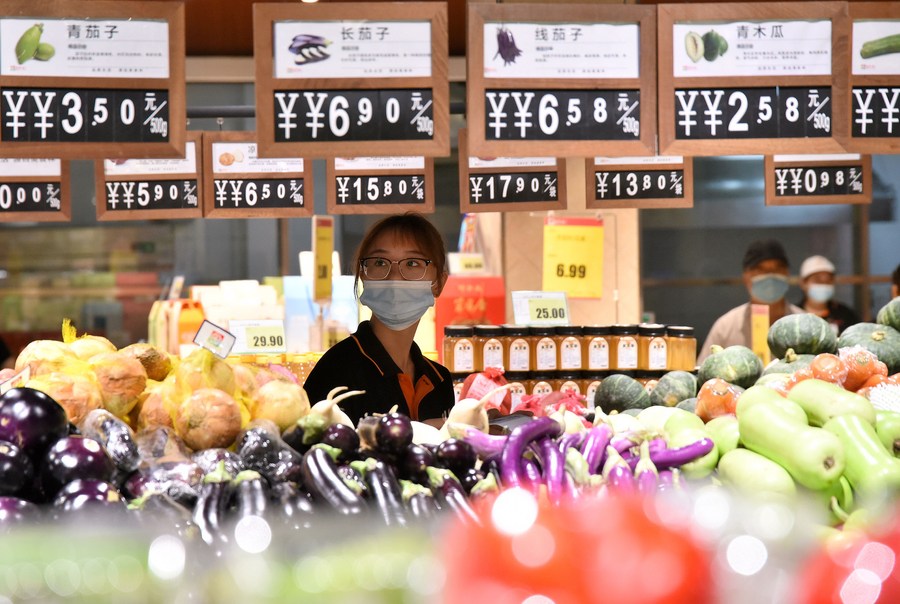China's consumer inflation remains stable, factory prices climb
 0 Comment(s)
0 Comment(s) Print
Print E-mail Xinhua, September 10, 2021
E-mail Xinhua, September 10, 2021

China's consumer inflation remained generally stable in August, while factory-gate prices registered expansion largely due to increasing commodity prices, official data showed Thursday.
The country's consumer price index (CPI), a main gauge of inflation, rose 0.8 percent year on year in August, data from the National Bureau of Statistics (NBS) showed.
The figure was lower than the 1 percent year-on-year growth recorded in July.
The slower growth was partly driven by a drop in food prices, which declined 4.1 percent last month. In particular, the price of pork, a staple meat in China, slumped 44.9 percent from a year earlier.
On a monthly basis, CPI increased 0.1 percent, lower than the figure registered in July. Food prices increased 0.8 percent while non-food prices decreased 0.1 percent.
Due to sporadic outbreaks of COVID-19, heavy rains and high temperatures, prices of vegetables and eggs rose 8.6 percent and 8.4 percent, respectively.
Prices of industrial consumer goods dropped 0.2 percent mainly due to the decline of international crude oil prices, while prices of services remained unchanged as travel service consumption such as air tickets and hotel bookings was impacted due to COVID-19 prevention and control measures.
Senior NBS statistician Dong Lijuan said continued government efforts had led to ample supply in the consumer market and stable prices in August.
China has set its consumer inflation target at approximately 3 percent for the year 2021, according to this year's government work report.
On the industrial side, China's factory prices continued to pick up in August amid booming demand and rising prices of bulk commodities.
The producer price index (PPI), which measures costs for goods at the factory gate, went up 9.5 percent year on year in August, faster than the 9 percent year-on-year increase registered in July, the NBS said.
On a monthly basis, China's PPI rose 0.7 percent in August, up 0.2 percentage points from July.
The faster expansion of PPI last month was due to price rises in coal, steel and chemicals, said senior NBS statistician Dong Lijuan.
Among the major sectors, coal mining and washing, chemical raw materials and products manufacturing, and ferrous metal smelting and processing were the main contributors to the increase in PPI inflation in August, according to Dong.
The widened scissors difference between CPI and PPI indicated that high raw material prices in recent months had not led to a rise in consumer goods prices, analysts said, noting government efforts to ensure stable supply and prices are still necessary.
NBS spokesperson Fu Linghui said commodity prices will remain high for some time amid global economic recovery, tight commodity supply in major raw material producing countries and fiscal stimulus and ample monetary liquidity in some major developed economies.
Commodity price hikes have raised production costs and squeezed profit margins for companies in the midstream and downstream of the industry chain, especially small and medium-sized enterprises.
To help cushion the stress from rising production costs due to high commodity prices, increased accounts receivable and epidemic and disaster impacts, the State Council executive meeting held on Sept. 1 pledged to increase the re-lending quota for small firms by another 300 billion yuan (about 46.44 billion U.S. dollars).
Local banks will be supported to lend to small and micro firms as well as individual businesses. Policies of providing loan interest discounts, rewards and subsidies to encourage lending for epidemic-hit industries and enterprises will also be improved, said the meeting.
China's state reserves authority has so far released a total of 420,000 tonnes of copper, aluminum and zinc in three batches from the national reserves this year to alleviate burdens on businesses over rising raw material costs.
The National Food and Strategic Reserves Administration said it would step up monitoring of commodity prices and organize follow-up releases of national reserves.
Looking forward, PPI is likely to remain high in the short term with fluctuations, said Guo Liyan, a researcher with the Chinese Academy of Macroeconomic Research.
But with the increase of coal production and supply and the release of bulk commodity reserves, among other factors, PPI is expected to ease, Guo said.
Guo suggested stepping up efforts to ensure supply and keep prices stable, making two-way adjustments in supply and demand, and increasing support for downstream industries and micro, small and medium-sized enterprises.






Go to Forum >>0 Comment(s)